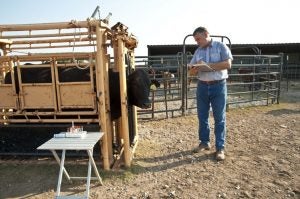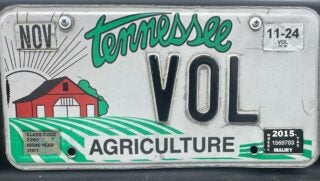Is animal welfare in opposition to profitability?
The short answer to that question is no.
It’s animal welfare and profitability, not animal welfare or profitability. There’s a misconception going around that larger-scale farms don’t care about the welfare of their animals in order to increase their profits. This couldn’t be further from the truth.
To start, what even is animal welfare? According to the American Veterinary Medical Association, animal welfare is “how an animal is coping with the conditions in which it lives.” Good animal welfare refers to scientific indications that the animal is “healthy, comfortable, well-nourished, safe, able to express innate behavior, and if it is not suffering from unpleasant states” (such as fear, distress, pain, etc.). Ensuring good animal welfare requires disease prevention, prompt treatment, appropriate shelter, nutrition, management, humane handling, and harvesting.

Farmers who are doing well financially are also doing a good job taking care of their animals. It takes money to run a farm. It takes money to run any business, from a restaurant to a tech company. High-quality feed, veterinary care, bedding, equipment, and the employees all cost money. Sometimes barns alone can cost millions of dollars — especially with proper ventilation, biosecurity, food and water efficiencies, lighting, vaccines, etc.
I toured a farm a couple weeks ago (Cooper Farms) that spent $35,000 on a water filtration system for their turkeys — sometimes animals drink and eat better than many of us do! Without the financial means, a farm could not meet its animal welfare goals.
Profitability is good for animal welfare, but is animal welfare good for profitability? The answer is also yes. Healthy, happy animals grow better and produce more, high-quality meat, milk, and other products. High-quality animal welfare makes sense!
See this Facebook post from the Cow Nerd page for more info on some of the awesome products livestock and poultry provide besides just meat and milk.
It’s not just about what makes sense, but what is right. Farming is a family business. About 98 percent of farms in the U.S. are family-owned, according to the U.S. Department of Agriculture. Farming isn’t just a job for many of us. We have a passion for caring for our animals, the land, and the families (including our own) who we feed because it’s the right thing to do. We have an ethical obligation as stewards of our animals.
Just because farming is a profession does not mean we don’t care about the well-being of our animals. Our animals are the foundation of our lives and livelihoods. Would you say teachers don’t care about their students just because they are paid to teach? Or that nurses and doctors don’t care about their patients because they’re paid to take care of them?
Being paid to do something doesn’t mean that you don’t care. Ideally you can make a living doing something that you enjoy. Isn’t that the goal?
It isn’t always easy to make money farming. Farmers received only 7.6 cents of the American food dollar in 2019. Most farmers don’t set their own prices, and the prices they receive are not always in sync with their cost of production. Agriculture is impacted by a multitude of factors from markets to vertical integration to weather and trade wars; to increasing costs of goods and services. Everything you see in the news impacts farming, including the pandemic. Unlike a factory manufacturing phone parts, agriculture relies on animals and plants, which are living things. You can’t just turn on and off a cow’s milk production to meet the market fluctuations. You can only wait so long to harvest a hog before it’s too big to be processed.
In the end, we need to make sure we have the money to support ourselves and to keep the farm going. We also want to be able to invest back into the farm and animals, keep improving, and to provide fair wages and benefits for employees.
Ultimately profitability is good for animal welfare and animal welfare is good for profitability.
Michelle Miller, the Farm Babe, is a farmer, public speaker and writer who has worked for years with row crops, beef cattle, and sheep. She believes education is key in bridging the gap between farmers and consumers.


